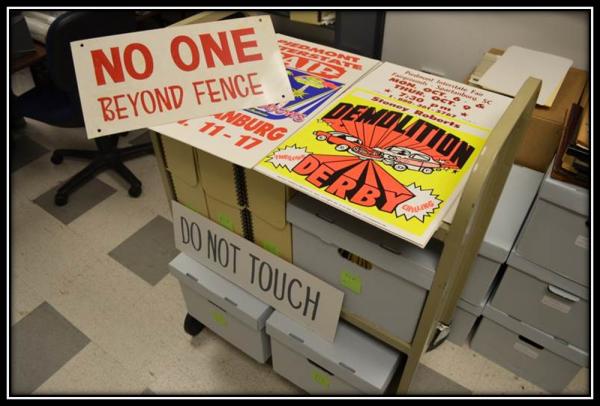50 States of Preservation: Spartanburg County Public Libraries, Spartanburg, SC

Fair Collections of The Piedmont Interstate Fair. The Fair has been a part of Spartanburg County for 110 years. This collection provides a snapshot into the Spartanburg's agricultural past and southern culture.
Images courtesy of the Spartanburg County Public Libraries

Fair Collections of The Piedmont Interstate Fair. The Fair has been a part of Spartanburg County for 110 years. This collection provides a snapshot into the Spartanburg's agricultural past and southern culture.
Images courtesy of the Spartanburg County Public Libraries
This feature is part of a series we call “50 States of Preservation,” in which we are touring small and mid-sized museums, libraries, historical societies, and other repositories across the country to show how they are helping to preserve the nation’s cultural heritage. Read other entries in the series here.
Founded in 1785, Spartanburg grew from a small courthouse village to become the hub of textile manufacturing in South Carolina during the late 19th and early 20th century. Today, Spartanburg is an important commercial center in South Carolina's Upcountry. Spartanburg County Public Libraries(SCPL) is a leader in the acquisition, preservation, and presentation of historical documents in the region and, as such, plays an important part in preserving its history. The library holds a large collection of monographs, manuscript materials, photographs, architectural and engineering drawings, maps, and audiovisual records. Some highlights: the B&B Studio collection—10,000 photographic negatives that portray Spartanburg County and environs from 1946 through the 1990s and the Stribling-Gooch collection of historic maps, plats, and surveys, dating from the 1850s to the present. Numerous family papers cover a wide array of historical topics ranging from South Carolina’s military history to the history of higher education. The library also holds organizational records of a number of community groups and businesses such as the Piedmont Interstate Fair, Spartanburg Men’s Garden Club, Hoechst Celanese Corporation, and Chamber of Commerce. Furthermore, SCPL possesses hundreds of radio broadcast recordings and oral histories. Among the latter are interviews conducted while researching a local African-American neighborhood displaced by urban renewal. Each year, thousands of people visit the library, including scholars, genealogists, and students, who find the local history materials valuable in their research.
The very size and variety of SCPL's collections present certain challenges. Inadequate storage space and the fragile condition of some collection items have limited public access. For example, several hundred architectural drawings are kept in plastic trash bins and separated from the general collection due to soot, mold and water damage. Ensuring the preservation of these materials is also difficult: many historic maps and plats are stored in cardboard boxes and stacked in a small mechanical closet, and negatives from a local photograph studio are housed in small acidic envelopes and kept in a filing cabinet.
To address these and other concerns, the SCPL is preparing to expand its facilities, which will eventually include a preservation lab and more environmentally controlled storage areas. To support these plans, the library recently received an NEH Preservation Assistance Grant which centered on an assessment of its holdings by preservation specialist Eva Grizzard of the Northeast Document Conservation Center. In 2016, Ms. Grizzard visited SCPL to assess the general condition of the collection and to gauge potential environmental risks. Her written report covered a wide range of preservation-related topics, from fire protection, security, and emergency preparedness to storage and handling practices.
Todd Stephens, County Librarian, is excited the library has moved in the direction of historical acquisition and preservation. “Funding from the NEH was critical. Having the Northeast Document Conservation Center’s guidance and insight will allow the library to move forward with making the necessary plans to address the needs of the collections. I believe it is our responsibility to preserve the public’s history, and having this assessment allows the library to insure proper planning and care of Spartanburg’s history.”
In every state, NEH supports organizations that preserve humanities collections. Preservation Assistance Grants for Smaller Institutions (PAGs) fund projects that help safeguard photographs, letters, documents, prints, moving images, sound recordings, maps, drawings, artworks, textiles, furniture, and artifacts, making them available for future generations. These collections help researchers, educators, and members of the public better understand the complex stories of the various cities, towns, and tribal groups that make up our nation.
Since 2000, NEH has made nearly 2,000 Preservation Assistance Grants to small and mid-sized organizations to preserve and care for their humanities collections. In all 50 states, the District of Columbia, and Puerto Rico and the Virgin Islands, PAG awards have funded preservation assessments, purchase of shelving, environmental monitoring equipment, and preservation supplies, and training for staff. Organizations in all states and U.S. territories are eligible to apply, and the program encourages applications from those new to NEH. The next application deadline Preservation Assistance Grants for Smaller Institutions is May 2, 2017. If you have any questions about this grant program, please contact us at @email or 202-606-8570.









